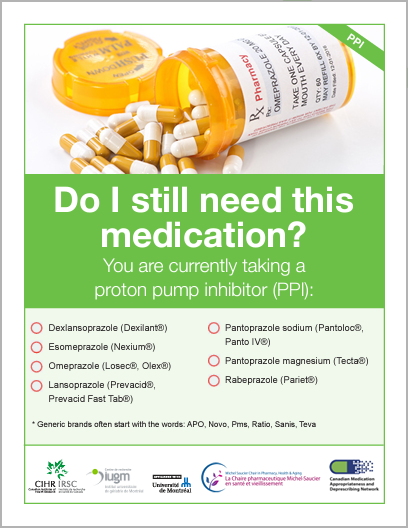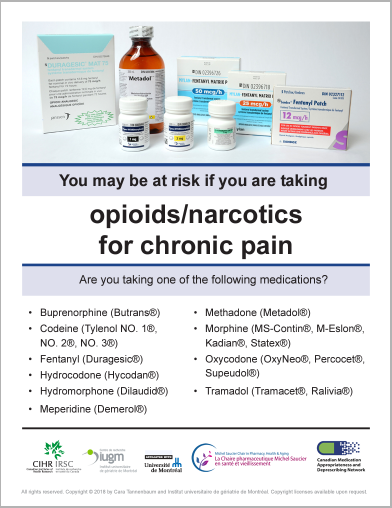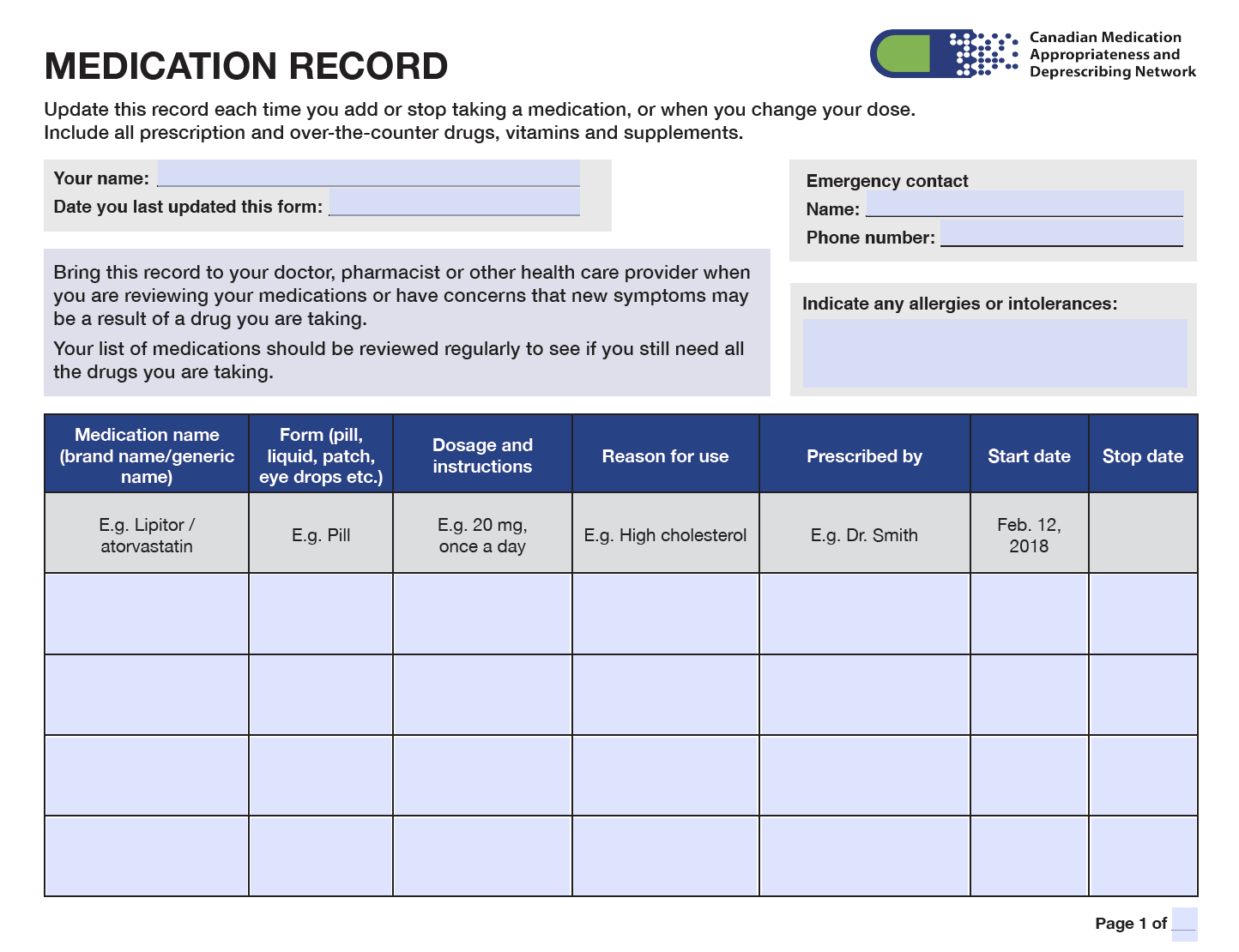Our resources
What can you do to become more informed and engaged in decisions about your medications?
These resources are a great start and are freely available for print and distribution. Share them with your friends or family members!
Some of these brochures have been translated to languages other than English and French.
Is it time to review your medications?
Download this brochure to learn more about when to review your medications and how to prepare for a medication review with your health providers.
Brochure about how medications affect us differently as we age
This pamphlet describes how aging changes our bodies and how this impacts medications effects.
Click here to download the brochure.
Brochures about the risks of certain medication classes
These brochures were created to inform and empower people about certain types of risky medications. Click on the links below to see the brochures and print them:
Sleeping pills and anti-anxiety medication such as lorazepam (Ativan®), oxazepam (Serax®), zopiclone (Imovane®) or zolpidem (Sublinox®).
Stomach pills for acid reflux such as pantoprazole (Pantoloc®), lansoprazole (Prevacid®), omeprazole (Losec®) or dexlansoprazole (Dexilant®)
Opioids for chronic non-cancer pain such as morphine (Statex®, M-Eslon®) or oxycodone (Oxyneo®, Percocet®)
Medications for allergies and itchiness (First-generation antihistamines) such as diphenhydramine (Benadryl®)
Antipsychotic medication for sleep or for symptoms of dementia (e.g. quetiapine (Seroquel®) or risperidone (Risperdal®))
Gabapentinoids medications for chronic pain, such as pregabalin (Lyrica®) or gabapentin (Neurontin®)
Anti-inflammatory medications such as ibuprofen (Advil®) or naproxen (Aleve®)
Medications for diabetes such as glyburide (DiaBeta®)
How to get a good night's sleep without medication
This brochure provides tips and techniques for a good night's sleep without sleeping pills.
Also see this website which contains information to help people manage insomnia.
Postcards on deprescribing
Poster on medication safety
Handout on promoting medication safety in Canada
Every day in Canada, seniors are harmed by risky medication use. We need to take action: let's inform decision-makers about medication safety policies! Check out this infographic to discover what a national medication appropriateness strategy could look like.
Public presentation on medication safety
This PowerPoint presentation, ranging from 30 minutes to 45 minutes, has been developed for a public audience. It covers the following key topics: 1) Why we become more sensitive to the effects of medications with aging, 2) Situations where the risks of medications may outweigh potential benefits, and, very importantly, 3) How the audience - public members, patients, caregivers - can work with healthcare professionals to engage in meaningful conversations about medications and deprescribing, and prevent harmful effects of medication overload. This presentation has been successfully presented to hundreds of groups across the country.
The presentation materials, complete with speaker notes, are available free of charge for those interested in presenting to members of their community. Contact us for more details and to request the presentation slide deck.
OTHER IMPORTANT RESOURCES
Medication safety quizzes
Try these short quizzes and test your knowledge about:
Articles on medication safety
Check out our series of articles on a range of topics related to medications and deprescribing.
5 Questions to ask about your medications
The Institute for Safe Medication Practices Canada suggests five questions to ask your health provider about your medications, especially if you are on a number of drugs.
Medication record
Use this record to track all your medications including the name of the drug, the dose, what it was prescribed for, how many times a day it is taken, when it was prescribed and who prescribed it. You can even type in your answers for better legibility!
Opioids for pain after surgery: your questions answered
If you've been prescribed an opioid medication for pain after surgery, here are the things to know and look out for to minimize pain, harmful effects and risk of addiction.
Learn how to combat insomnia without sleeping pills
Sleepwell is a website with information to help people manage insomnia without relying on sleeping pills.
Coyote's Food Medicines
The ‘Coyote’s Food Medicines’ story was created to encourage conversations about wellness and how to manage medications for a healthy life. This powerful story was written by Elders of Northern Secwepemc and is the result of a collaboration between the Shared Care Committee (a partnership of Doctors of BC and the British Columbia government) and the First Nations Health Authority.
Polypharmacy Reduction in Residential Care
Polypharmacy means taking more pills than is necessary or appropriate. Taking more pills than you need can increase your risk of experiencing harm from medications. What can you do to prevent harm from medications? Watch this video from the Shared Care Polypharmacy Risk Reduction group to learn strategies for residential care residents and their caregivers.

























